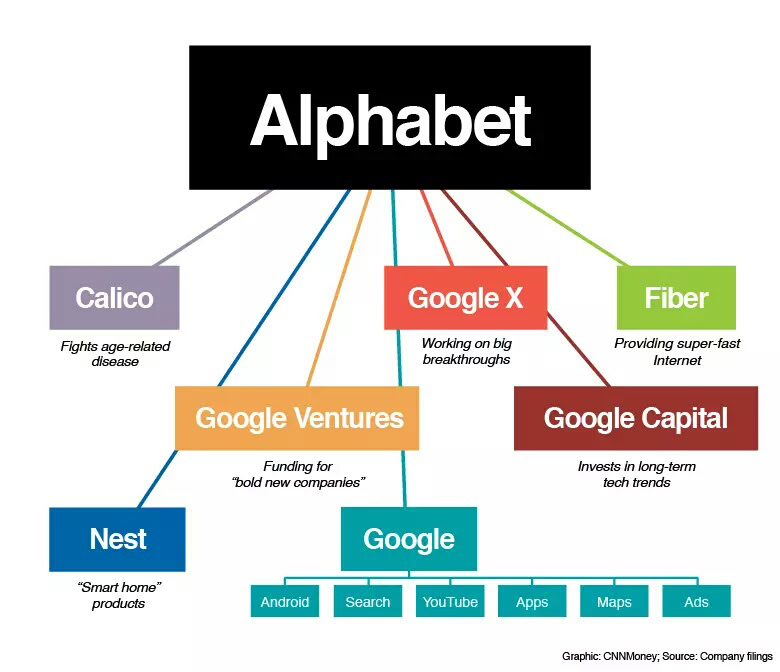Affiliate links on Android Authority may earn us a commission. Learn more.
Alphabet to expand its language: Eric Schmidt sees dozens of companies in the future
Published onOctober 14, 2015

Mountain View surprised the world when it announced the creation of and restructuring into Alphabet, a holdings company of which Google is now just a part of. Indeed the name seemed both amusing and surprisingly logical. In addition to being official, Google even registered its full-alphabet domain. The company is still in it’s very early stages however, and Eric Schmidt is now promising it’s about to get bigger. A lot bigger.
Earlier today, at the Virtuous Circle conference held in Menlo Park, California, Mr. Schmidt offered a rather candid take on the whole situation: “I wake up, and I’m the chairman of Alphabet…We sort of announced it without actually knowing which companies it would be. So we’re still working the details.” The idea, of course, is that the company is going to be expanding.
To give an idea of just how many holdings that might entail, the Chairman suggested that, “After 26, we’re going to probably transcendental numbers” (like π) which prompted laughter and his follow-up: “You think I’m kidding?” Schmidt continued by indicating “I’ve been meeting with the current CEOs of the Alphabet companies and the proposed ones. So you’ll see a lot coming.”

For the love of letters
Given that the alphabet literally is 26 letters, it would logically make sense for the Company to hold as many subsidiaries. It would be even more incredible if each could actually have a unique letter thus truly embodying the namesake. At the very least, Mr. Schmidt’s remarks indicate that we are likely to see more announcements in the near future. Whether these may be new ventures started by Alphabet itself or else the results of external acquisitions – like Nest was – it will likely mean that Mountain View will begin to enter other industries.
Some may have reservations about what this could entail, especially amid ongoing allegations that Google has created not only a search monopoly, but an Android-related one as well. That the company could now venture into wholly independent or unchallenged territory means there is both ample room for growth and for domination, the latter of which becomes easier given the fact that Google-related services are already deeply integrated into many aspects of our digital lives.

At the same time, Alphabet seems to be focused on not just changing the future, but improving it as well. Calico for example, is related to healthcare and could theoretically produce treatments or cures for conditions that even existing big name players like Pfizer of GSK have yet to. And as always, the presence of a major new player shakes things up for all those involved, often resulting in improvements that benefit society, the general public, or at the very least consumers.
Some Nexus 6 users have already noticed the positive changes Google has brought to the “carrier relationship” situation with its Project Fi initiative, something that looks to be expanding in a major way later this month. Why wouldn’t the company be eager to try this approach on a much larger scale
And Android?
What this whole situation means for Android is somewhat of a mystery. The mobile OS has now been reduced to a segment of Google which is, itself, now a segment of Alphabet. Ultimately what Google does is Google’s business, and that may – or may not – mean that Alphabet inadvertently winds up doing something counterproductive via another subsidiary or acquisition. While it would logically follow that Mr. Schmidt and the various Alphabet CEOs would want to keep things organized and compartmentalized, Google has for years been charged with becoming more of a slow moving entity given its growing size instead of the once agile player it was in the early days.
This could mean that Android might indirectly benefit from another sibling company’s work or IP, but it could also mean something much less productive. At the very least, it will be of interest to see how Alphabet can manage its various subsidiaries in the long term, as even established players like Sony have been saddled with fiscal problems and been forced to sell off or spin off key parts of their corporate empire.

Today’s news serves to strengthen the confidence people like Eric Schmidt have in his organization’s future, and offers a glimpse into just what kind of ongoing plans are being discussed. The future will be, shall we say, “M’m! M’m! Good.”